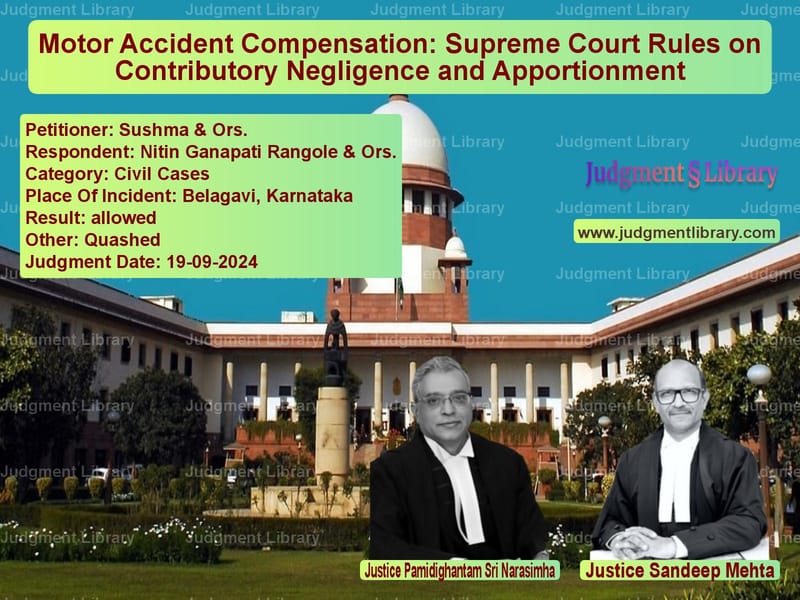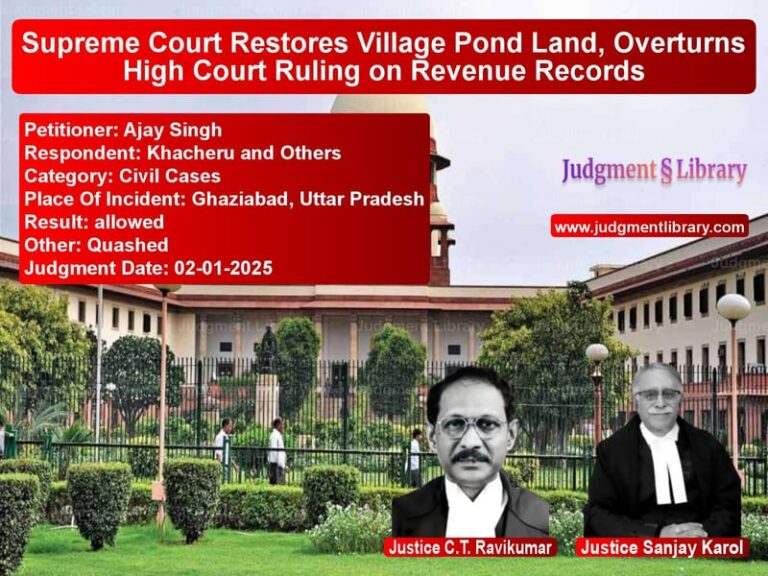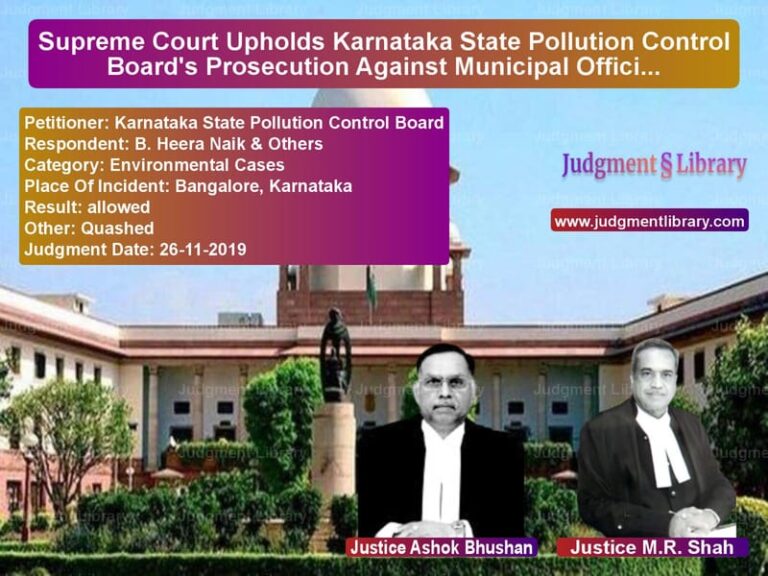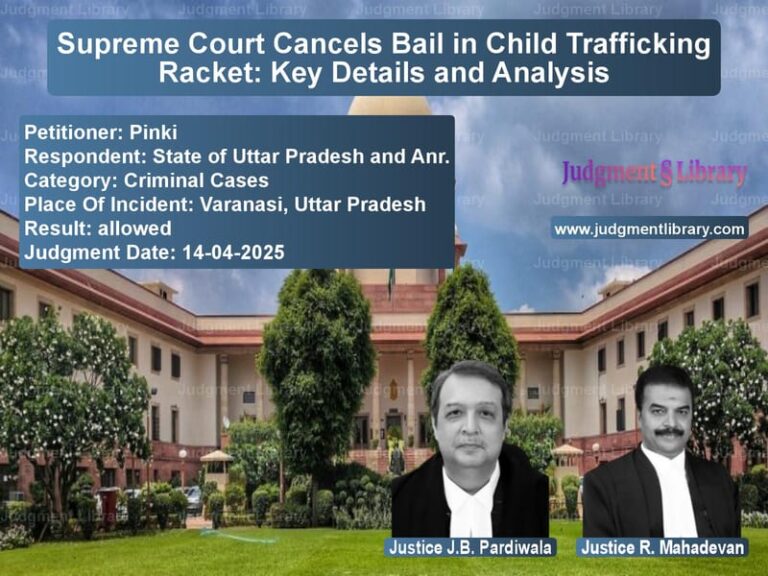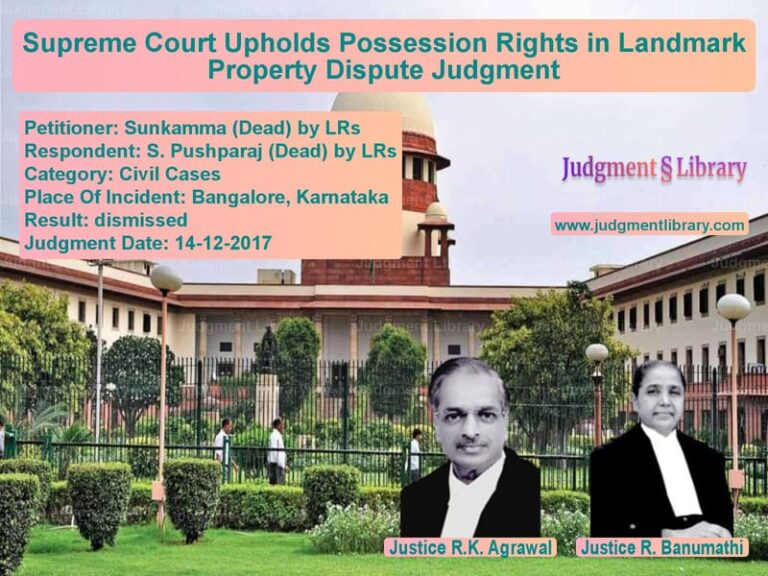Motor Accident Compensation: Supreme Court Rules on Contributory Negligence and Apportionment
The Supreme Court of India delivered a pivotal judgment in the case of Sushma & Ors. vs. Nitin Ganapati Rangole & Ors., focusing on the issue of contributory negligence in motor accident cases and how compensation should be apportioned in such situations. The case arose from a tragic accident on August 18, 2013, involving a car and an abandoned truck on a highway in Karnataka. The Court’s decision is significant for setting precedents on how negligence by both parties in a road accident should be dealt with, especially in determining the rightful compensation for victims and their families.
The main question addressed was whether the driver of the car, who collided with the abandoned truck, could be held partially responsible for the accident due to contributory negligence. The lower courts had previously reduced the compensation by 50% due to this contributory negligence. However, the appellants challenged this reduction, arguing that the fault lay entirely with the truck driver who left the vehicle abandoned without any precautionary measures to alert other drivers.
Background of the Case
The tragic accident took place on August 18, 2013, when a car bearing registration number MH-09/BX-4073 collided with a 14-wheeler trailer truck, registration number MH-09/CA-0389, which was left abandoned in the middle of a busy highway. The truck was not marked with any warning lights or reflective signs to alert incoming traffic, which contributed to the accident.
The collision resulted in the death of four passengers in the car, while one passenger, Smt. Sushma (wife of deceased Ashtavinayak Patil), survived but sustained grievous injuries. The claimants filed separate compensation petitions under Section 166 of the Motor Vehicles Act before the Additional Motor Accident Claims Tribunal in Belagavi, Karnataka. They sought compensation from the owner of the offending truck and its insurer, Reliance General Insurance Company.
The Tribunal ruled that the accident resulted from contributory negligence, where both the truck driver and the car driver shared fault. The Tribunal awarded compensation, reducing the amount by 50% on the grounds of contributory negligence. The claimants, dissatisfied with the deduction, filed appeals in the Karnataka High Court.
Legal Proceedings and Arguments
Petitioner’s Arguments (Claimants)
- The claimants argued that the truck driver was solely responsible for the accident as the truck was abandoned in the middle of the road without any warning signs, lights, or indicators, which is a violation of traffic regulations.
- The claimants pointed out that the car driver could not have avoided the collision, especially considering the lack of any warning signs or lights from the truck.
- The appeal was against the 50% reduction in the compensation amount due to contributory negligence, arguing that the car driver was not at fault, and the truck driver’s negligence was the primary cause of the accident.
Respondent’s Arguments (Truck Owner and Insurer)
- The respondents contended that both the car driver and the truck driver were responsible for the accident.
- The respondents pointed out that if the car driver had exercised caution, he could have avoided the collision, and thus, contributory negligence applied.
- The respondents also argued that the Tribunal’s ruling on contributory negligence was correct, as the accident could have been avoided if the car driver had been vigilant and not driving at high speed.
Supreme Court’s Observations
Justice Pamidighantam Sri Narasimha, delivering the judgment, noted:
“The principle of contributory negligence does not apply in cases where the negligence of one party is the sole cause of the accident. The responsibility for ensuring that a vehicle is safely parked and visible to other road users lies with the owner and driver of the vehicle.”
The Court further stated:
“Even if the car driver had been more cautious, the fact remains that the truck was left in the middle of the road without any precautionary measures. It was virtually impossible for the car driver to see the truck in time, especially under the circumstances of poor visibility due to the lack of streetlights and the truck being left without any warning signs.”
Key Findings and Judgment
- The Supreme Court disagreed with the lower courts’ finding on contributory negligence, stating that the car driver could not have avoided the collision due to the negligence of the truck driver in leaving the vehicle abandoned without any warning lights or indicators.
- The Court ruled that the compensation awarded by the Tribunal was unjustly reduced by 50% due to the contributory negligence of the car driver.
- The Court restored the full compensation as determined by the Tribunal and modified by the High Court, holding that the appellant-claimants were entitled to the entire compensation amount without any deductions.
- The Court also directed that the insurer of the offending truck was responsible for indemnifying the compensation award.
Principles Governing Contributory Negligence
The Supreme Court cited previous judgments to explain the principle of contributory negligence, stating that in cases where one party’s negligence is the primary cause of the accident, the other party’s negligence cannot be used to reduce the compensation. The Court emphasized that contributory negligence applies only when the plaintiff’s actions directly contribute to the cause of the accident.
The Court specifically referred to the case of Union of India v. United India Insurance Co. Ltd. (1997), in which it was held that contributory negligence cannot be imputed to passengers in a vehicle, even if the driver was negligent.
Impact of the Judgment
This judgment has several key implications for future motor accident compensation cases in India:
- Clarity on Contributory Negligence: The ruling clarifies that contributory negligence should not be used to reduce compensation when the negligence of one party is the sole cause of the accident.
- Increased Accountability for Vehicle Owners: The decision reinforces the responsibility of vehicle owners and drivers to ensure that their vehicles do not pose a danger to other road users, particularly when parked on highways or public roads.
- Protection of Victim’s Rights: The judgment ensures that victims or their families are not unjustly deprived of rightful compensation due to unfair application of contributory negligence.
- Strengthening Consumer Protection Laws: The decision strengthens the legal framework that protects the rights of victims in motor accident claims, ensuring that the fault of the driver or vehicle owner is adequately considered when determining compensation.
Conclusion
The Supreme Court’s judgment in Sushma & Ors. vs. Nitin Ganapati Rangole & Ors. is a landmark decision that upholds the rights of victims in motor accident cases, ensuring that they receive fair compensation for their losses. By overturning the reduction in compensation based on contributory negligence, the Court has emphasized the need for accountability and fairness in such claims. This judgment will have lasting implications for the way contributory negligence is treated in future motor accident cases and sets a clear precedent for the protection of victims’ rights.
Petitioner Name: Sushma & Ors..Respondent Name: Nitin Ganapati Rangole & Ors..Judgment By: Justice Pamidighantam Sri Narasimha, Justice Sandeep Mehta.Place Of Incident: Belagavi, Karnataka.Judgment Date: 19-09-2024.
Don’t miss out on the full details! Download the complete judgment in PDF format below and gain valuable insights instantly!
Download Judgment: sushma-&-ors.-vs-nitin-ganapati-rango-supreme-court-of-india-judgment-dated-19-09-2024.pdf
Directly Download Judgment: Directly download this Judgment
See all petitions in Contract Disputes
See all petitions in Damages and Compensation
See all petitions in Consumer Rights
See all petitions in Insurance Settlements
See all petitions in Judgment by P.S. Narasimha
See all petitions in Judgment by Sandeep Mehta
See all petitions in allowed
See all petitions in Quashed
See all petitions in supreme court of India judgments September 2024
See all petitions in 2024 judgments
See all posts in Civil Cases Category
See all allowed petitions in Civil Cases Category
See all Dismissed petitions in Civil Cases Category
See all partially allowed petitions in Civil Cases Category

